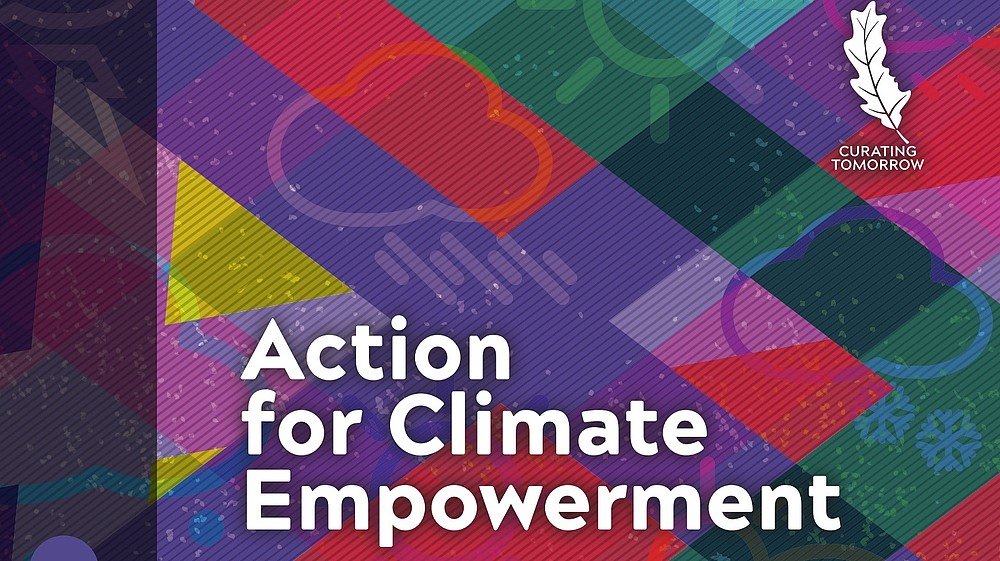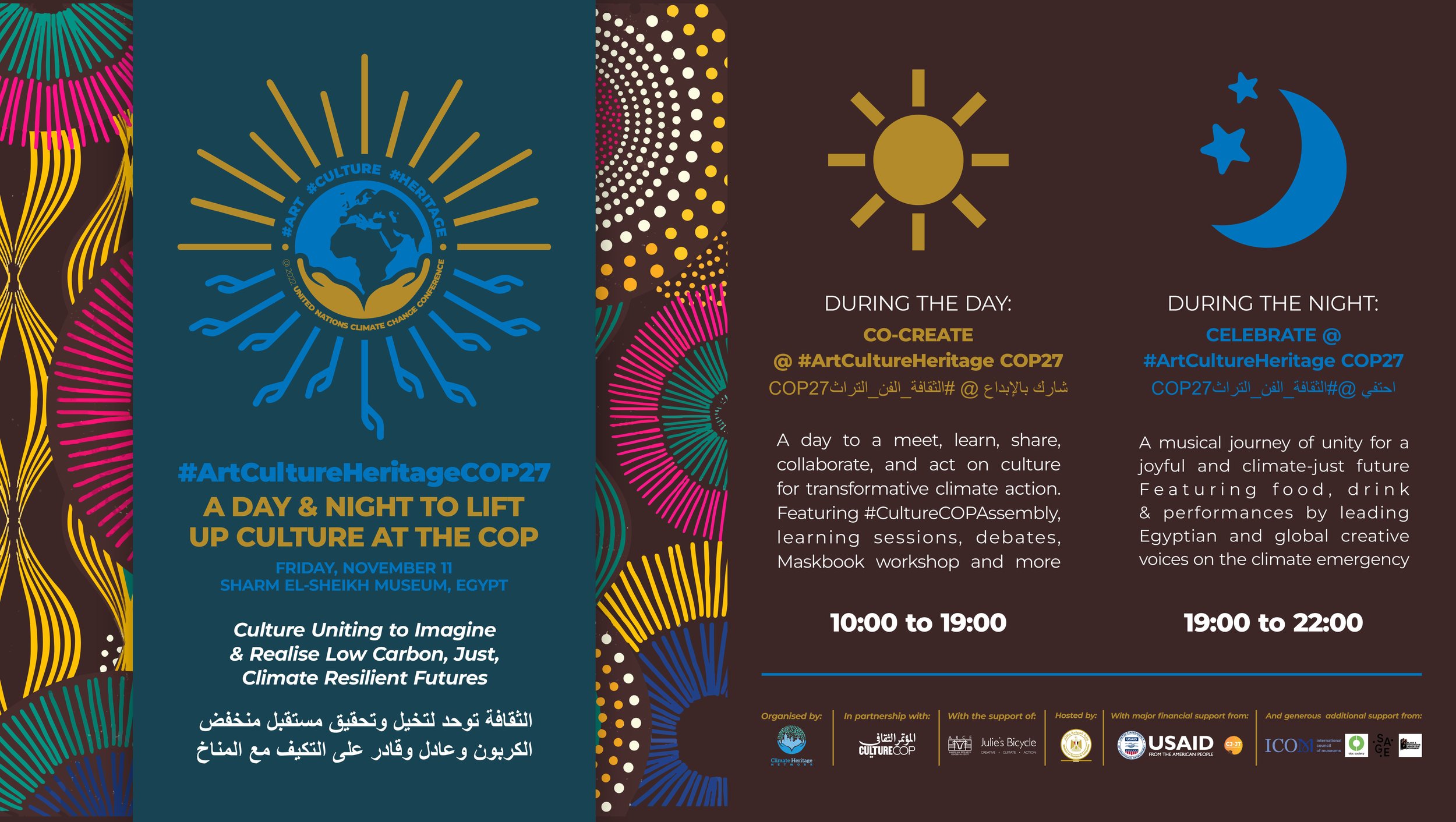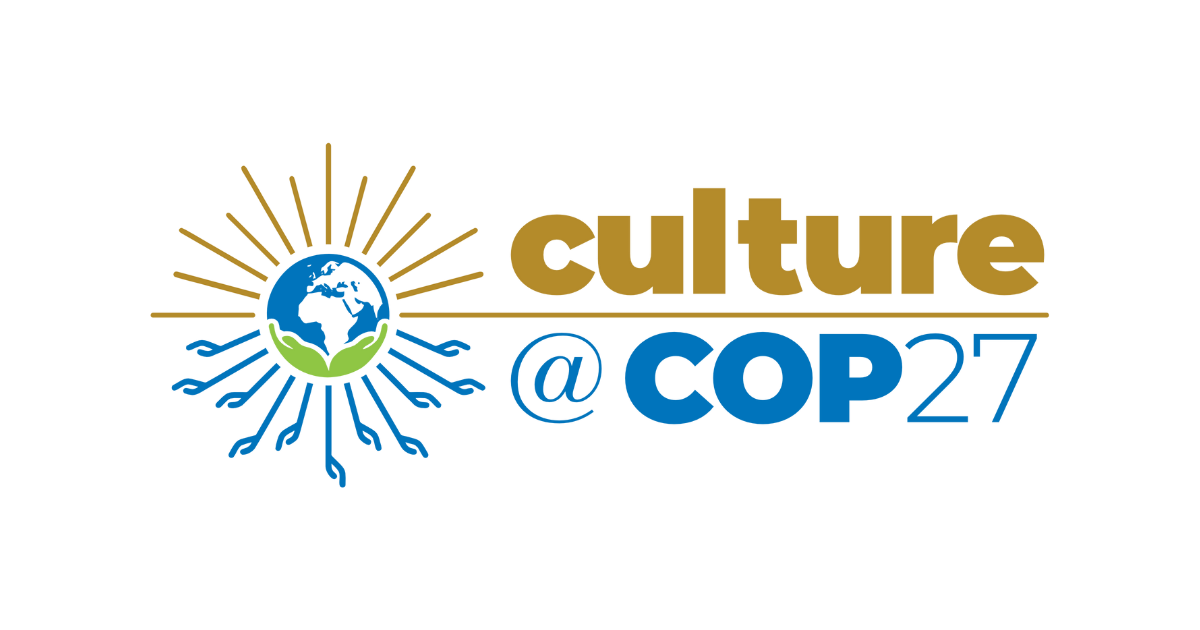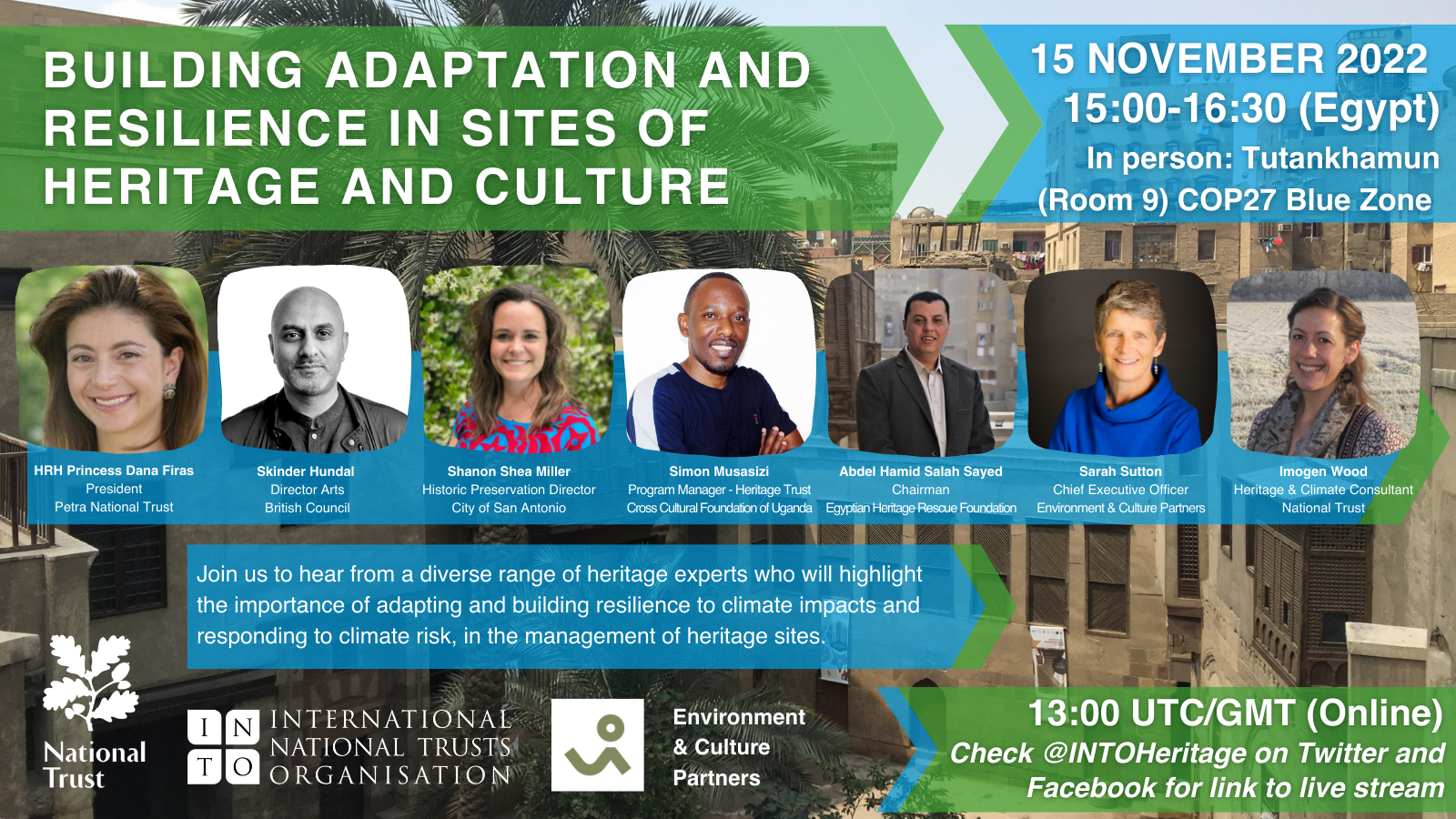
COP27 Events
COP27 Side Event: Planning, Design and Development in the Global South: The “How To” for People + Planet
Event Description
Africa and the Global South will construct billions of square meters of buildings and infrastructure by 2030. Presenters will set out necessary design and construction guidelines, with regional examples, for equitable and resilient development to meet 50% x 2030 emissions reduction targets.
Venue
Room Hatshepsut (300), Blue Zone
Organisers
Architecture 2030

Culture & Creativity for Climate: research and innovation at work
COP27 Italian Pavilion Side Event
“Culture & Creativity for Climate: research and innovation at work”
by ISPC Institute of Heritage Science - CNR
Sharm El-Sheikh, Egypt
16 November 2022 - 15:30 / 17:30
Thematic Focus
Heritage, Culture & Creativity for Climate Adaptation and resilience; Research and Innovation
Event Description
Four projects are presented mainstreaming the impact and value of heritage, culture and creativity as important enablers for economic regeneration, climate adaptation and mitigation. They represent the diversity of innovations across sectors, cultures and generations to underline that an open and collaborative ecosystem for innovation is the foundational key for novel solutions to make the green transition successful while maintaining our cultural heritage as memory of the past creativity and social cohesion and landmarks for identity.
Agenda
ISPC Institute of Heritage Science - CNR - Elena Gigliarelli (coordinator)
GamesForest.Club - Georg Boxtermann
ART-ER Attrattività Ricerca Territorio – Daniela Sani
The Fraunhofer-Gesellschaft - Johanna Leissner
EIT Culture & Creativity - Bernd Fesel
Moderator: Bernd Fesel EIT Culture & Creativity
Georg Boxtermann (GamesForest.Club)
GamesForest.Club conquers climate change with the creative power of the games industry
Abstract:
GamesForest.Club is a non-profit, which enhances the creative power and network of the global games industry to conquer climate change. With data driven and transparent reforestation and forest conservation, we reduce the games industries and their players' ecological footprint, regenerating climate and biodiversity. Thanks to the playful visualization of impact with the digital forest twin, impact becomes measurable and tangible, engaging communities to participate and design new ways to contribute to the solution.
Daniela Sani (ART-ER Attrattività Ricerca Territorio)
Activating territories and communities on cultural climate change mindset transition through inclusive and innovative participatory paths
Abstract:
ART-ER Attractiveness Research Territory is fostering the Emilia-Romagna region’s sustainable growth by developing innovation and knowledge, attractiveness and internationalisation. It presents local experiences to support environmental policy, systemic change and behaviour transformation via participatory process and experiential training with special attention to marginal areas.
Johanna Leissner (Fraunhofer Sustainability Network)
Strengthening cultural heritage resilience for climate change – where the Green Deal meets cultural heritage
Abstract:
The intervention reports about the results of the EU expert group of European Member States how climate change affects cultural heritage. But cultural heritage is not only a victim of climate change but offers solutions to fight against the climate crisis. Cultural heritage can provide traditional knowledge and skills how to adapt and to reduce the carbon footprint of the building sector, for example by promoting the art of dry stone walling or the revitalisation of old air wells. It contributes to economic recovery by stimulating the energy efficient upgrading and renovation of old and abandoned buildings and this will also help to overcome the housing crisis.
Elena Gigliarelli (ISPC Institute of Heritage Science - CNR)
The Beep project: "BIM for Energy Efficiency in the Public sector", as a driver for energy and environmental improvement of the public built heritage
Abstract:
Energy resilient historical buildings ensuring their own conservation over time are also a key resource for Climate Change mitigation and adaptation while improving comfort and health of occupants. The BEEP project addresses the issue of energy efficiency of the built heritage in an innovative way through a process based on a strong digitisation of analysis, design and decision support tools, and fostering instruments to achieve financial support. The methodology was tested in buildings of historical and artistic value in seven Mediterranean countries.
Filippo Calcerano (ISPC Institute of Heritage Science - CNR)
Sustainable and low impact solutions for knowledge, monitoring, management, maintenance, renovation of Cultural Heritage
Venue
Italian Pavilion Area C, Pavilion 1 (next to the passage with Area B, Pavilion 7). Blue Zone - in person only
Organiser
ISPC Institute of Heritage Science - CNR
Contact
Elena Gigliarelli – elena.gigliarelli@cnr.it

Building adaptation and resilience in sites of heritage and culture
Event Description
Around the world people are adapting built and natural heritage in the face of climate change. Practitioners from across the world will highlight and reflect on the importance of adapting and building resilience to climate impacts, and responding to climate risk, in the management of heritage sites.
Event Time
3:00 pm - 4:30 pm EET / 1:00 pm - 2:30 pm UTC/GMT
Venue
Hybrid: Tutankhamun (Room 9) COP27 Blue Zone
Contact
Catherine Leonard
Organisers
International National Trusts Organisation, National Trust, Environment and Culture Partners, Climate Heritage Network

Intangible and tangible intersections between culture, climate and gender
Venue
Hybrid - Green Zone, Hall B
Link to livestream
https://cop-resilience-hub.org/
Organisers
Climate Heritage Network

Build Change at COP27
Venue
Hybrid - Buildings Pavilion (Blue Zone)
Livestream link
Live from COP27 Buildings Pavilion auditorium | Globalabc
Event Description
While structural retrofits have clear benefits to improving the resilience of buildings, in particular in climate-vulnerable communities, how does it affect the global goal to reach net zero?
In this session, Build Change will discuss the findings of a recent set of case studies conducted in the Global South.
Initial findings have shown that retrofitting existing houses can save 60% of a home’s embodied carbon compared to new construction, and still 40% savings even when expansion is included in the improvement. This suggests that by improving existing housing instead of building new, tens of thousands of tons of emissions can be avoided every year.
With inputs from additional partners from across the carbon reductions and sustainability sectors, this session will discuss how these case studies factor into broader net zero goals. As projections for new construction estimate about half of building-related emissions from now until 2050 will be from upfront embodied carbon, structural housing retrofits housing may be a decarbonization solution in hiding, with the potential to accelerate the race to zero and simultaneously build global resilience.
Speakers
Ximena Rico, Autodesk (virtual)
Lori Ferriss, Goody Clancy (virtual)
Monica Schroeder, Build Change (in-person)
Lizzie Collins, Build Change (virtual)
Audrey Nugent, WorldGBC (in-person)

Museum action for climate empowerment
Culture Heritage Network member NEMO, the Network of European Museum Organisations, is inviting you to a free webinar featuring Henry McGhie, Curating Tomorrow, and NEMO Policy Officer Elizabeth Wilde on 14 November. Organised to coincide with COP27, the online learning opportunity will inspire and empower museums to take action for the climate.
Webinar begins at 12 pm EET (11 am CET)
Event Description
Register now to join the NEMO Webinar to learn about concrete actions museums can take to contribute to the Paris Agreement and in fighting climate change. In addition, Elizabeth Wilde will introduce NEMO's most recent work and research regarding museums and their status within the sustainable transition of Europe, including the main findings and recommendations resulting from our Europe-wide survey conducted earlier this year.
Henry McGhie will outline the Glasgow Work Programme on Action for Climate Empowerment, which was adopted at COP26, runs till 2031, and is the main opportunity for museums to contribute to the United Nations Framework Convention on Climate Change (UNFCCC) and Paris Agreement in concrete ways. He will also present a new guide on measuring and reporting greenhouse gas emissions, developed in partnership with Co2Action, a US-based greenhouse gases (GHG) accounting firm.
While governments and their representatives progress the political aspects of climate action at COP27, join us for a practical session on how you can implement this new Programme to put museums to work for the Paris Agreement, and make your museum part of the change. Bring your questions!
The webinar is free of charge, but registration is mandatory. Please note that the webinar is limited to 200 participants on a first come, first serve basis.
Meet the speakers
Henry McGhie has a background as an ecologist, museum curator and manager. He set up Curating Tomorrow in 2019 to help empower museums to contribute to sustainable development agendas, including the SDGs, climate action, biodiversity conservation, Disaster Risk Reduction and human rights. He is a member of the ICOM Sustainability Working Group, and works internationally with museums, museum organisations and partners. He has been involved with the UNFCCC since 2017 and was involved in the development of the Glasgow Work Programme.
Elizabeth Wilde has been involved in a variety of cultural and political organisations and projects and currently contributes to the Museums for Future initiative. She studied political science at California State University Long Beach and earned her MA at the Berlin School of Economics and Law, in both instances dedicating her research to the socio-political impact of cultural policies and practices. Passionate about the role of cultural institutions in achieving social and climate justice, she is committed to advocating for museums at the Network of European Museum Organisations as their Policy Officer.
Contact: office@ne-mo.org
Organiser: NEMO - the Network of European Museum Organisations

#ArtCultureHeritageCOP27 featuring #CultureCOPAssembly
In partnership with Egyptian Ministry of Tourism and Antiquities
Climate Impact on Cultural Heritage in Egypt - Challenges and Solutions
Event Description
The session will focus on the concept of climate change in Egypt and its impact on its cultural heritage, and the challenges facing specialists in this regard, in addition to proposing solutions to the impact of this phenomenon on antiquities in Egypt. The aim of this session is to provide an overview of Egyptian antiquities and cultural heritage in Egypt, highlight its importance, raise the awareness of the concept of climate change as one of the most important challenges facing us in this period, present a methodology for dealing with the impact of climate change on cultural heritage, and present a crisis management plan on how to deal with the risks related to climate change, in order to put the bases for the necessary measures to address these changes. And coordinate the preparing of a draft concept note that includes mechanisms for the protection of cultural heritage.
Venue
Sharm El-Sheikh Museum (in-person only)
Participants
Experts from the following ministries, organizations and authorities:
Ministry of Environment
The International Council of Museums (ICOM), in addition to ICOM Egypt
The Islamic World Educational, Scientific and Cultural Organization (ICESCO)
Nuclear Materials Authority (NMA)
National Research Institute of Astronomy & Geophysics (NRIAG)
Organizer
Supreme Council of Antiquities, Ministry of Tourism and Antiquities










